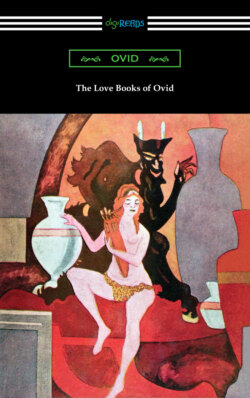Читать книгу The Love Books of Ovid - Ovid - Страница 21
На сайте Литреса книга снята с продажи.
ELEGY XIII. HE ENTREATS THE DAWN TO HASTEN NOT HER COMING.
ОглавлениеO, over the Ocean doth she come, from the arms of her aged husband. Over the waves she cometh, the bright goddess whose car brings back the day. O beautiful Aurora, whither dost thou hasten? Stay, O stay thy flight. So, yearly, may the birds make solemn offering to the shades of Memnon. This is the time when I love to lie in my sweet one’s sheltering arms; this, if ever, is the moment when ’tis sweet to press her softly to my side. Now, too, sleep is pleasant and the air cool, and the birds discourse sweet music from their tender throats. Whither fleetest thou, with a speed to men and to their mistresses unwelcome? Draw in with thy shining hand the dewy reins of thy swift coursers.
Ere thou risest, the mariner can clearly see the stars, and wandereth not at random over the wide seas. When thou dost appear, the traveller, for all his weariness, must quit his couch, and the soldier seize his fighting gear. Thou art the first to behold the husbandman shouldering his mattock; the first to call the lagging oxen to the yoke. Thou robbest children of their sleep and handest them over to the master for their tender fingers to suffer the blows of his cruel ferule. Thou bringest the surety to the court, where a single word may make or mar him. To advocate and to judge thou art alike unfriendly, for each is forced to rise to take up a case. ’Tis thou who, when a woman would fain taste the sweets of repose, callest her to spin the wool with unwearying hands. All this I could endure; but who would bear that young women should rise thus early in the morning, save the man that hath no mistress of his own? How often have I longed that night would not make way for thee, that the stricken stars would not flee before thee! How often have I longed for the winds to shatter thy car, or for one of thy steeds to founder in the hollow of a cloud! Ah, cruel one, whither dost thou hasten? Since thou had’st a son whose skin was black, such was the colour of his mother’s heart. Would that Tithonus were free to speak his mind about thee, the heavens I trow would ne’er have known a more lascivious woman. Thou fleest from thine aged spouse, because old age hath chilled him, and leavest the old man betimes to mount thy hateful car. But if in thine arms thou heldst thy favourite, Cephalus, thou wouldst cry, “Go slow, go slow, ye coursers of the Night!”
And though thy spouse be wasted with old age, wherefore should my love pay the penalty? Was it I that led thee to mate an old man? See how many hours of sleep the Moon gave to the youth she loved; and her beauty is no whit inferior to thine. The father of the gods himself, that he might not behold thy face so often, joined two nights in one, so as to let his passions have full play.
Thus did I upbraid her; be sure she heard me, for she blushed. Howbeit the day appeared no later than his wont.
